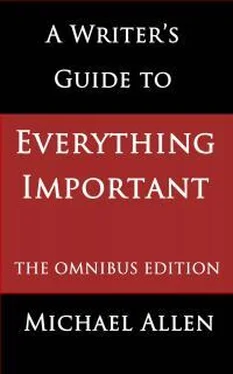I outlined the problem. ‘What would you recommend?’
Both boys put their finger on Harry Potter. Which I bought.
So did millions of others, acting on playground word of mouth, and it would be interesting to speculate how many millions Mr Little made as a result. The word on the street is that it was a normal-terms deal, 15% for the UK and 20% of everything else.
Obviously, that sort of arrangement could not last for ever, not with all those millions sloshing around, and after about 15 years (1996-2011) the agent was ‘dumped’. That’s the way it was put in the Daily Telegraph in 2012, so it must be true.
The Telegraph report went on to describe Mr Little as ‘the enigmatic agent who spotted the potential of her first manuscript.’
Ms Rowling, the report said, had managed to avoid going to court with her ex-agent. Instead, the two parties had reached an amicable agreement to separate, ‘the details of which are confidential.’
Well, I dare say Ms Rowling can afford this settlement, whatever it cost. But it would be nice to foresee such a possibility, and to forestall it if possible. Wouldn’t it?
4.6.3 Contracts with publishers as negotiated by agents
Given the hard times we live in, agents are obliged to pay close attention to their position in the long term as well as the short term.
Should an agent ever negotiate a contract with a publisher, while acting on your behalf, you can be quite sure that the contract will recognise the fact that the agent has been appointed as your representative, and that all royalties due under the contract will be paid to him; and then, we hope, to you.
Such a clause will probably also specify that this arrangement applies for the life of the contract. So, even if, in the course of time, you replace agent 1 with agent 2, this arrangement will probably still apply. I say probably because media lawyers are adept at counting the angels on the head of a pin, and they get paid by the hour, you know. So there well be much debate about the precise meaning of such a clause, both in court and on the courtroom steps.
Suppose your new agent, agent 2, sells the film rights of a book which was first published under a contract written by agent 1. How does that work out?
I’ve never been in that happy position, but I suspect that, if you’re not careful, you will end up like one of those not-too-bright heavyweight boxers, some of whom sold 110% of themselves over a period of time – boxing not being an occupation which improves the memory.
I wonder how the clause about receiving commission for the life of the contract was interpreted in the case of the contracts written by UK agent Christopher Little.
There are other complications. What happens if you self-publish a book that the agent couldn’t sell for you. Who, if anyone, gets a commission then?
Oh, I tell you, it’s no end of fun being a writer.
4.6.4 Offer courses
Publishers such as Faber are not the only people to have noticed that writers are willing to pay large sums to be taught how to write.
There are, of course, countless universities and colleges which offer degrees in ‘creative writing’. And now the UK literary agency Curtis Brown has joined the club.
‘At London's leading literary agency, authors agents and industry professionals are teaching a new generation of writers.’
Well, there’s an interesting variation on being a boring old agent, plain and simple.
As usual, it’s hard to find a mention of fees for the Curtis Brown academy, but, in internet reports, £2,400 has been suggested as the price.
4.6.5 Conferences: the pay-a-fee-to-find-an-agent circus
L.J. Sellers, a well established full-time novelist, recently blogged that she was no longer going to attend Thrillerfest, which is an annual conference for thriller fans and writers.
Thrillerfest is in any case an expensive conference to attend, and may involve an expensive flight to get there. But what makes L.J. Sellers unwilling to make an appearance there is Agentfest, which is a sub-conference within the larger gathering.
Agentfest, as the name suggests, enables writers to have one-to-one pitching sessions with agents. Well, I say agents. Some disenchanted attendees have noted that those representing the agencies are mostly junior members of staff. Such junior staff are delighted to go to the conference to represent their employers, because they get free room and board and everyone treats them like a goddess. Some newbie writers are thrilled if the agent hands them a business card. However, do I need to add that an enthusiastic response from an agent on the conference floor may later lead to a disappointing letter?
Even more to the point, however, L.J. Sellers has come to the conclusion that anything which encourages new authors to sign with an agent – any agent – is counterproductive. ‘I don’t have anything against agents personally. But their role in publishing has become mostly obsolete… This practice [agents recruiting at conferences] seems unscrupulous.’
4.6.6 Agents turn publisher
We have already noted that some publishers – even the biggest names of all – have gone into business as publishers of ebooks. For a consideration, of course.
And guess what? Quite a few agents have done the same.
First into the act, as far as I can see, was the gentleman from Harvard, Andrew ‘The Jackal’ Wylie.
Whatever else he may be, Wylie is no sort of fool, and as early as 2010 he launched his own ebook publishing initiative, Odyssey Editions. The plan was to work through Amazon to release digital editions of major books by big-time writers who were already represented by the Wylie agency. Vladimir Nabokov’s controversial novel from the 1950s, Lolita , was among the first.
The Odyssey Editions arrangement was intended to bypass the publishers of the print editions entirely. It would secure (one assumes) a higher royalty for the writer (or the writer’s estate) than would be available if the print publisher owned the digital rights, and published an ebook version. And of course, it would result in a substantially increased share of the proceeds going to the Wylie agency.
I can’t say that I’ve ever seen a spreadsheet analysing the various figures and proving the point about the distribution of income, but, from the outside, that appears to be the way the thinking went.
There were two major problems with this initiative, both of which could have been anticipated.
First, the big publishers were always going to argue that, under the original contracts (sometimes written decades earlier) they already owned and controlled the digital rights, even though the contract didn’t spell that point out in detail because no one had ever heard of digital at that point in time.
Second, the big and powerful publishers are definitely bigger and more powerful than any agency, even a fairly forceful one such as Wylie.
Result? Random House told Wylie, in short order, that unless he stopped playing silly buggers they were not going to do any further business with him. Full stop.
Given that Wylie has 700 clients with books to sell, and given that Random House (now merged with Penguin to form the biggest publisher in the world) was threatening to refuse to consider any new product from said clients, Wylie really had no choice but to back down.
If you look up Vladimir Nabokov’s famous novel Lolita on Amazon.co.uk, you will find that the ebook edition is now published by Penguin.
Odyssey Editions still publishes about 20 ebooks, some of them by famous names. But, given that there are 700 clients, most of whom have a number of books in their backlist, the ebook side of the Wylie agency appears to be, for all practical purposes, defunct.
Читать дальше












